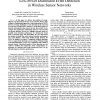Free Online Productivity Tools
i2Speak
i2Symbol
i2OCR
iTex2Img
iWeb2Print
iWeb2Shot
i2Type
iPdf2Split
iPdf2Merge
i2Bopomofo
i2Arabic
i2Style
i2Image
i2PDF
iLatex2Rtf
Sci2ools
129
click to vote
INFOCOM
2007
IEEE
2007
IEEE
Low-Power Distributed Event Detection in Wireless Sensor Networks
Abstract—In this paper we address the problem of energyefficient event detection in wireless sensor networks (WSNs). Duty cycling is a fundamental approach to conserving energy in WSNs. However, it brings challenges to event detection in the sense that an event may be undetected or undergo a certain delay before it is detected, in particular when sensors are low duty-cycled. We investigate the fundamental relationship between event detection and energy efficiency. Based on a simplified network model, we quantify event detection performance by deriving the closed forms of detection delay and detectability. We also characterize the intrinsic tradeoff that exists between detection performance and system lifetime, which helps flexible design decisions for WSNs. In addition, we propose a completely localized algorithm, CAS, to cooperatively determine sensor wakeups. Without relying on location information, CAS is easy to implement and scalable to network density. Theoretical bounds of eve...
Communications | Detection Performance | Energy Efficient Event Detection | Event Detection | INFOCOM 2007 |
Related Content
| Added | 03 Jun 2010 |
| Updated | 03 Jun 2010 |
| Type | Conference |
| Year | 2007 |
| Where | INFOCOM |
| Authors | Yanmin Zhu, Yunhao Liu, Lionel M. Ni, Z. Zhang |
Comments (0)

